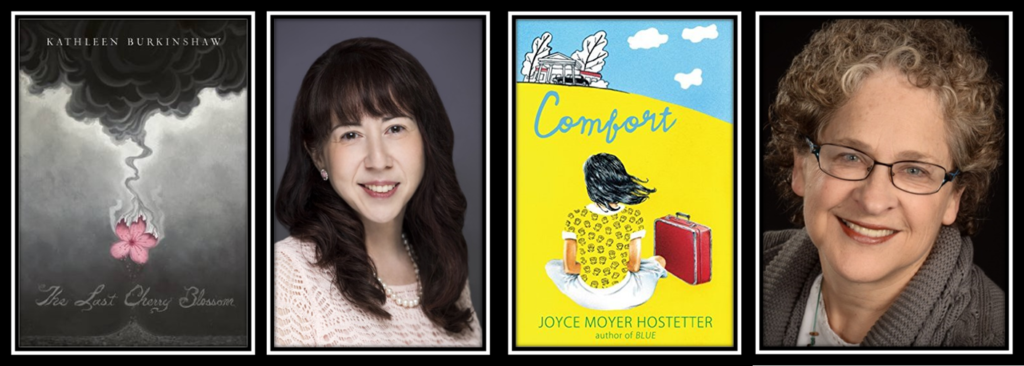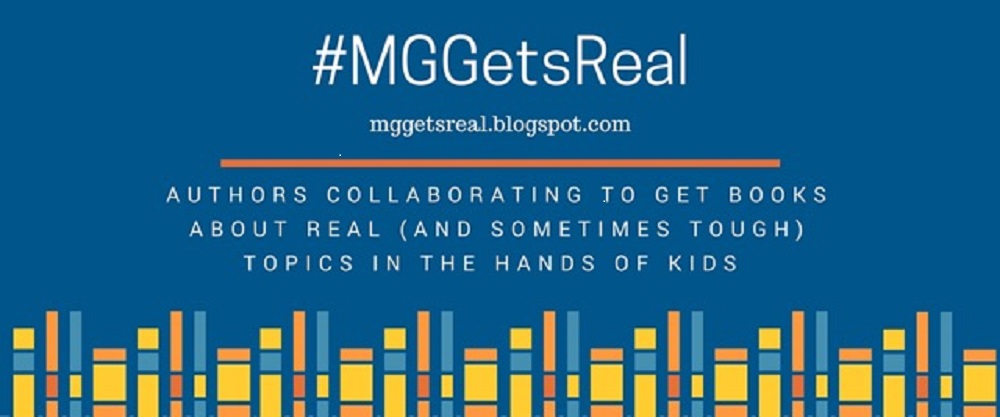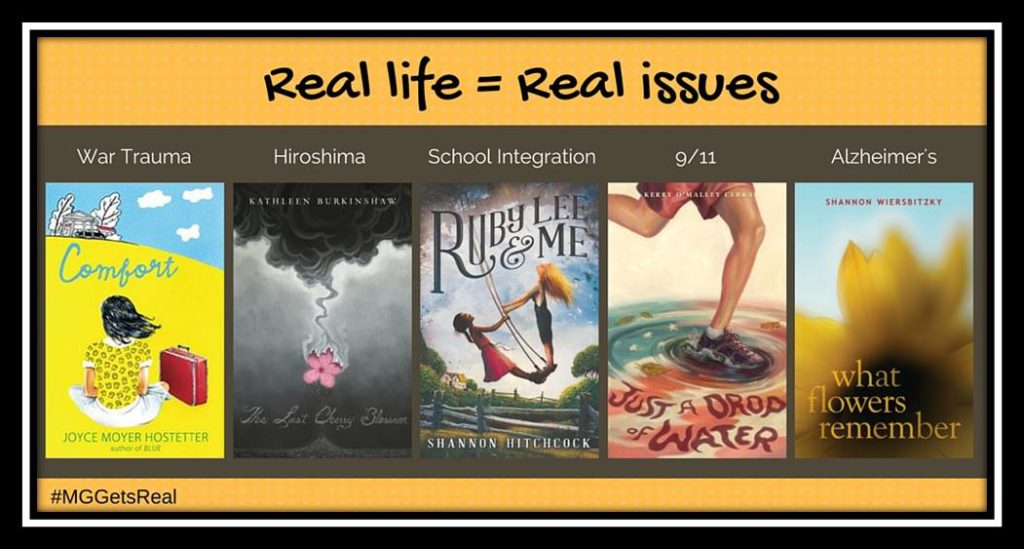Thank you Pirate Tree for inviting us to your blog.
Kathleen Burkinshaw: Joyce Moyer Hostetter and I are part of a marketing effort with three other middle grade authors. We are #MGGetsReal and our theme is Real Life = Real Issues. All of our books deal with difficult situations/events but also leave the MG reader with hope.
Today Joyce and I will be talking about Joyce’s book, COMFORT and my recent debut, THE LAST CHERRY BLOSSOM.
Joyce Moyer Hostetter: Both our historical fiction books take place during WWII. THE LAST CHERRY BLOSSOM is set in Hiroshima during the last year of the war and covers the devastation of the bombing on the city and in the life of 12-year-old Yuriko.
KB: Yes, and Hiroshima was also a pivotal point in COMFORT, since Ann Fay’s father’s PTSD heightens after the radio announcement that the atomic bomb was dropped. I think the line in your book when Ann Fay says that “Killing someone you hate isn’t the same as living in peace.” rings true for both Ann Fay’s world and Yuriko’s world.
JMH: Oh, I think so, too.
KB: COMFORT is the sequel to BLUE. I know when you first started writing BLUE it was about polio and the miracle that happened in North Carolina, yet you found yourself also writing about WWII. In COMFORT did you see the direction of writing disability rights along with PTSD or did that come as you researched PTSD?
JMH: I wrote Comfort because I wanted to find out what would happen next. Ann Fay’s affectionate relationship with her father was central to BLUE and I was curious/concerned about how both of their experiences might change them. I knew they’d have adjustments after their individual traumas.
I didn’t know that Ann Fay would seek therapy at Warm Springs, GA. But as that unfolded, the disability rights issue emerged. Rehabilitation meant assimilating into an able-bodied world.
Both Ann Fay and Daddy experience a disability. Each is facing trauma that hasn’t fully entered the national consciousness. Thanks to Franklin Roosevelt, polio and its resulting disabilities were beginning to get attention. And that paved the way for us to acknowledge war trauma a few decades later in connection with Vietnam War vets.
KB: And I know from my own experience, a physical disability also has its emotional trauma. I found it interesting that your two main characters, Ann Fay and her father, as well as my main character Yuriko suffered from PTSD for different reasons. Do you think Ann Fay may not have understood what her father was going through if she wasn’t going through her own issues of being labeled a “polio”?
JMH: I believe having polio made Ann Fay more sensitive to the struggles of others. But even more, I believe that going to Georgia Warm Springs Foundation gave her a healing community. Being there with other people with polio was nurturing to her so she, in turn, understood how to find help for her dad. And she made it happen!
I wonder if, to some extent, the theme of sensitivity to others in COMFORT is similar to what you hope as a Japanese American that American readers will gain from reading THE LAST CHERRY BLOSSOM?
KB: Yes, I hope that American readers can learn that the people one might consider the enemy are not so different from themselves. By putting a face on the people affected by the bomb, they could feel the loss. Also just as important, I hope they realize nuclear weapons should never be used again.
So with COMFORT, are you hopeful that by reading it, students may gain an understanding or some empathy to what PTSD really is, instead of the stigma it currently has?
JMH: What I really hope COMFORT does for readers is validate their stories. I hope it helps them to name their traumas and especially to connect with people who have similar experiences.
KB: My mother also went through stigma issues of being labeled hibakusha. Some people in her own country shunned hibakusha or didn’t want them marrying into the family because no one understood how radiation may have affected them. I didn’t even know my mother was from Hiroshima, until I overheard a conversation when I was around 7- years-old. Before that, she only told me she was from Tokyo.
JMH: Oh, I feel sad to hear that your mother was shunned. Surviving the bombing and experiencing all that loss was horrific in itself. But being forced to pretend it never happened? I can’t imagine how she survived the emotional aftermath and grew into such a lovely human being.
KB: Yes, it truly saddens me. Sometimes I feel angry on my mother’s behalf because the atomic bombing, which she had no control of, caused some people to see her as someone who should feel shame. I’m amazed that despite it all, she never lost her ability to love.
JMH: I grieve for your mother because she couldn’t tell her story for fear of isolation. Now you’ve done that for her. You validated her experience and not only hers, but also the traumas of many readers. And you’ve given us your amazing, resilient mother as a role model. I hope it inspires readers to rise above as your mom did. I sit here wishing I’d met her.
KB: Thank you so very much. She was the bravest woman that I will ever know.
JMH: This is also one of the reasons I think we both feel middle grade historical fiction is so important in a classroom. Historical fiction can enhance the curriculum when a mere two paragraphs in a text book (and in your case, the famous mushroom cloud pictures) do not tell the whole story.
KB: It’s so important for middle graders to have the opportunity to learn that people from another culture, race, or someone with a disability, are not so different from themselves. If we fail to humanize the people involved in historical situations, it is so easy to repeat the same mistakes.
JMH: Absolutely. That’s exactly what your recently published THE LAST CHERRY BLOSSOM can bring to the classroom
KB: And you will be contributing another historical novel, when AIM, a prequel to BLUE publishes in October.
JMH: That brings us back to why we formed #MGGetsReal. To get the word out about each other’s books. We hope anyone wanting more info will visit our website.
KB: See you there! And thank you for dropping by The Pirate Tree.


